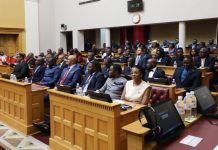By Mathias Haufiku and Tileni Mongudhi | 27 August 2020
NAMIBIA’s national student fund has cancelled a N$180 million contract to supply university students with 32 000 laptops due to “serious irregularities”.
The procurement committee of the Namibia Students Financial Aid Fund (NSFAF) last month recommended that the N$180 million tender be awarded to Green Enterprise Solutions.
However, the fund’s acting chief executive officer, Kennedy Kandume, blocked that proposal.
He felt the tender documents contained inconsistencies, which made the entire evaluation process questionable.
Documents seen by The Namibian show that Green Enterprise Solutions was among 11 hand-picked companies asked by NSFAF to supply the laptops.
Kandume on Tuesday confirmed that the contract award was cancelled.
“Considering the economic climate, we cannot have a contract of that magnitude to one company. We have to use multiple suppliers,” he said.
He did not say whether NSFAF would use the same bid evaluation committee.
“The bidding process will restart during the course of next week. The adjudication process will commence and an award will be made,” he said.
The laptop initiative is part of the government’s support plan for higher education institutions and students to boost e-learning platforms and to ensure that remote teaching takes place during the Covid-19 pandemic.
The fund’s top officials, it is understood, are now on a collision course over the contract that was supposed to be split among several companies, but ended up being awarded to one company only.
The contract to supply the laptops was sent out to potential bidders on 20 July 2020 and closed four days later.
Some companies that were invited to bid flatly refused to do so, citing that the time frame before closure raised red flags.
Only five of the 11 companies invited reportedly submitted their bids.
Others alleged that some companies were already tipped off to get their paperwork in order even before the invitation letters were sent out.
“How can a tender of N$200 million run for four days? It is not practical to compile a comprehensive bid submission in that period unless you were tipped off already,” said one of the companies which refused to bid.
FUNDING CONCERNS
Minister of finance Iipumbu Shiimi in July allowed the NSFAF to buy students laptops without publicly advertising the tender.

“Pursuant to the above your request for exemption is hereby granted,” said Shiimi in his letter dated 6 July 2020.
The Namibian has seen plans for the student laptop initiative outlining how it would be implemented.
“Due to the number of laptops that are going to be procured, the NSFAF intends to acquire the laptops from more than one service provider given that the service provider is Namibian-owned and is an authorised reseller,” the plan stated.
Bidders, according to the plan, must also have a Namibian warranty centre and offer after-sale support.
The plan further stated that NSFAF would have to reduce its contribution to the 2020 academic year non-tuition fees from N$17 000 to N$11 000 per student to enable the purchase of laptops.
NSFAF budgeted N$6 000 for each laptop.
“Government will subsidise the laptop cost by 50%. The students will be given two options to finance the remaining 50%. One option will be for the student to finance it through an NSFAF loan, the other option will be through cash payment,” the proposal said.
There are, however, concerns that student funding may be affected by the decision to purchase the laptops, because the fund would be responsible to service the interest estimated to be around N$20 million per year.
“The return on investment for borrowing costs on the N$238 million loan will be compromised, because loan funds will be used for both non-NSFAF beneficiaries and NSFAF beneficiaries,” an official document said.
It was submitted to Kandume’s office by the fund’s procurement committee.

The student fund said other Covid-19 support measures include a N$3 720 loan to all international students who wish to apply.
The fund also bought students 28 000 wireless internet devices.
The NSFAF, according to Kandume, is also assisting tertiary institutions to upgrade their technology systems to enable online education.
Students who would benefit from this initiative are from the University of Namibia, the Namibia University of Science and Technology, the International University of Management, Triumphant College, Philipi Trust Namibia, and the International Training College (Lingua).
Others include students from the Namibia Evangelical Theological Seminary, the Botho Higher Education Institution, the Business School of Excellence, Headstart Montessori, Monitronic Success College, the Welwitschia Health Training Centre, the Institute of Open Learning, and the Tulipohamba Training and Assessment Institute.
* This article was produced by The Namibian’s Investigative Unit. Send us tips via your secure email to investigations@namibian.com.na.






